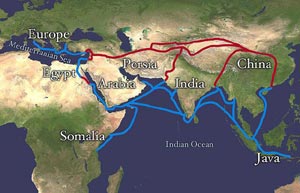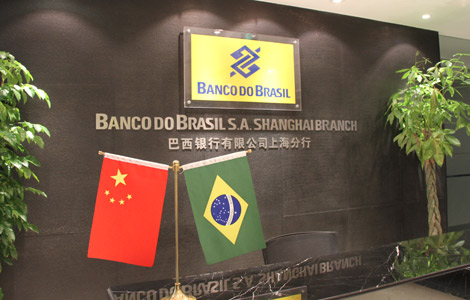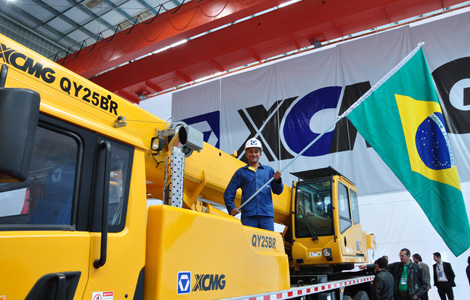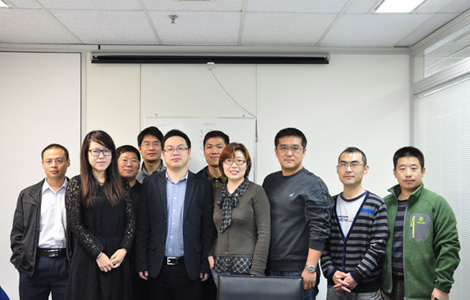Silk Road offers Sino-Arabian blueprint
Updated: 2014-06-06 02:38
By Pu Zhendong and Li Xiaokun (China Daily)
|
||||||||
|
 President Xi Jinping and other leaders attend the opening of the Sixth Ministerial Conference of the China-Arab States Cooperation Forum in the Great Hall of the People in Beijing on Thursday. [Photo / China Daily]
|
Energy, infrastructure, along with trade and investment to form mainstay of links
President Xi Jinping outlined a blueprint for greater cooperation with Arab states on Thursday, describing them as “natural partners” in regional development projects, a Silk Road economic belt and a maritime Silk Road.
Xi said China and Arab nations should establish a cooperative framework centered on energy cooperation, with infrastructure along with trade and investment as “two pillars”, and aim for high-tech breakthroughs in nuclear energy, aerospace and new energy.
“The next decade poses a critical development period for both China and Arab states, which calls us to carry forward the Silk Road spirit and rejuvenate our countries,” Xi said at the opening of the Sixth Ministerial Conference of the China-Arab States Cooperation Forum.
He also announced that the two sides will expand their trade volume from $240 billion to $600 billion in the next 10 years.
Chinese companies were encouraged to invest in sectors such as energy, petrochemicals, agriculture, manufacturing and services in Arab states.
Xi said discussions should be held on establishing a China-Arab technology transfer center, jointly building the Arab training center for peaceful use of nuclear energy and opening China’s Beidou Navigation Satellite System to Arab states.
Foreign Minister Wang Yi told reporters, “We have gotten closer at the forum.”
More than 200 guests from China and Arab states participated in the forum, which celebrates its 10th anniversary this year.
They agreed to jointly combat terrorism and extremism, and strengthen efforts to facilitate a free trade agreement between China and the Gulf Cooperation Council.
The council is a political and economic union of six major oil exporters that border the Gulf — Bahrain, Kuwait, Oman, Qatar, Saudi Arabia and the United Arab Emirates.
Zhu Weilie, director of the Center for China-Arab States Cooperation Forum Studies and a professor at Shanghai International Studies University, said the Silk Road initiatives were an upgraded version of Chinese enterprises’ “going-out” strategy.
Kuwaiti Prime Minister Sheikh Jaber Al-Mubarak Al-Hamad Al-Sabah, who attended the forum, said Kuwait fully supports the Silk Road initiatives, and urged an acceleration of negotiations for a free trade agreement.
“It will be a milestone in terms of developing the prospects of China-Arabian cooperation,” he said.
Nabil el-Araby, secretary-general of the League of Arab States, said China is the only major country among the permanent members of the United Nations Security Council that has consistently supported the just cause of Arab states and helped developing nations.
“China’s cooperation with Africa has proven that it has sincerity and enough credit to keep its promises,” he said.
Yao Kuangyi, a researcher of Middle Eastern studies at the China Foundation for International Studies and a former Chinese ambassador to Turkey, said the forum has created a new model of cooperation for China and Arab states.
Last year, China imported $140 billion in commodities from Arab countries, with Chinese investment reaching $2.2 billion.
In the next three years, Beijing will train 6,000 people to work in Arab countries and have 10,000 artists visit each other in the coming decade.
Xinhua contributed to this story.
|
 |
 |
| Revival of ancient Silk Road 'essential' for Asian nations | Assessing the fabric of a 'new Silk Road' |

 Peking Opera charms New York City
Peking Opera charms New York City
 CUAA hosts basketball tournament in NYC
CUAA hosts basketball tournament in NYC
 Brazil ready to help China score
Brazil ready to help China score
 Banco do Brasil opens branch in Shanghai
Banco do Brasil opens branch in Shanghai
 White house sit-in against immigrant deportation
White house sit-in against immigrant deportation
 XCMG's new factory to create over 1,500 jobs
XCMG's new factory to create over 1,500 jobs
 Virginia's governor bids to expand China business ties
Virginia's governor bids to expand China business ties
 Portuguese language training helps Chinese in Brazil
Portuguese language training helps Chinese in Brazil
Most Viewed
Editor's Picks

|

|

|

|

|

|
Today's Top News
Chinese navy to join 2014 RIMPAC naval drill
5 dead in Las Vegas shooting
Bergdahl says he was tortured
China's exports rebound in May
'Blue guards' shore up ocean conservation
Top court to enhance transparency
Chinese woo Buffet's lunch auction
US opens patent probe into toner cartridges
US Weekly

|

|






